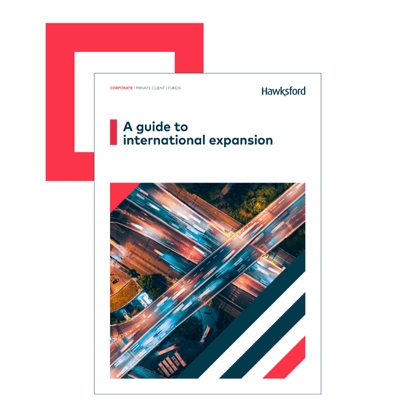Announced on 7 October 2025, the Irish Budget 2026 introduces important measures that include a substantial enhancement to the research and development (R&D) tax credit, extension to the Key Employee Engagement Programme (KEEP) as well as an increase to the revised entrepreneurs’ relief lifetime limit.
Small budgetary movements can significantly shape how companies enter and operate in Ireland. Below, we provide a breakdown of the Budget measures announced by the government and what they mean for businesses establishing a presence here.
Key highlights from the Irish Budget 2026
- Increase in research and development (R&D) tax credit to 35%
- Increase in the lifetime limit under the revised entrepreneurs’ relief
- Key Employee Engagement Programme (KEEP) regime extension
- Special Assignee Relief Programme (SARP) regime extension
- 2% Universal Social Charge (USC) ceiling increase
- Reduction in value-added tax (VAT) rate for hospitality sector to 9%
Increase in research and development (R&D) tax credit to 35%
A major pro-business measure in Budget 2026 is the enhancement of Ireland’s R&D tax credit. This is an incentive designed to support companies investing in scientific and technological advancement in Ireland, the United Kingdom (UK) and the European Economic Area (EEA).
The credit rate will increase from 30% to 35% of qualifying R&D expenditure, a welcome move that may strengthen Ireland’s international competitiveness as a location for innovation. The limit for first-year refunds under the scheme will also increase from €75,000 to €87,500.
These changes reinforce the government’s commitment to supporting innovation, and we expect they will make Ireland’s R&D regime even more compelling to global businesses seeking to expand research operations here.
Increase in the lifetime limit under the revised entrepreneurs’ relief
Meanwhile, entrepreneurs continue to be recognised as key drivers of growth and innovation for Ireland. The government is enhancing the revised entrepreneurs’ relief that allows business owners to pay a reduced 10% Capital Gains Tax (CGT) rate (versus the standard 33% rate) on the sale of qualifying business assets.
From 1 January 2026, the lifetime cap on gains eligible for the 10% rate will increase from €1 million to €1.5 million.
While modest in scale, this change may enhance the incentive for you to consider growing a venture in Ireland and restructure or exit with a lower tax burden, potentially freeing more capital for reinvestment.
Key Employee Engagement Programme (KEEP) regime extension
The Irish Budget 2026 also announced an extension to the KEEP regime until 31 December 2028 (from its original end-date of 2025) to help smaller companies reward and retain talent. The extension is still subject to approval by the European Commission.
The KEEP regime allows qualifying employees to exercise share options without incurring income tax, Universal Social Charge (USC) or Pay Related Social Insurance (PRSI) on gains. Instead, the gain will only be subject to the CGT on eventual disposal. This can provide a significant tax advantage to employees and make it easier for Irish businesses to attract and engage key employees with share-based remuneration.
All other scheme conditions remain unchanged, but the extended timeframe may provide you with additional scope to implement KEEP as part of your long-term talent strategy.
Special Assignee Relief Programme (SARP) regime extension
The SARP will be extended for an additional five years, now running until 31 December 2030. This provides a partial income tax exemption (on 30% of income above a threshold) for eligible highly skilled individuals and reduces the cost for multinationals sending talent to Ireland.
Note that several changes will take effect for new SARP entrants in 2026:
- Higher qualifying salary threshold: The minimum income to qualify will increase from €100,000 to €125,000 per annum. This adjustment ensures the relief is targeted at higher-earning strategic personnel.
- Extended filing deadline: Employers using SARP will have until 30 June (following the tax year) to file the end-of-year return, extended from the previous 23 February deadline. This will allow for additional time to meet reporting obligations.
2% Universal Social Charge (USC) ceiling increase
The Irish Budget 2026 also includes a tweak to the USC for low-to-middle earners. Currently in 2025, the 2% USC rate applies up to an income of €27,382. From 1 January 2026, the 2% rate band will extend up to €28,700.
The USC is a tax on gross income (after certain limited deductions) that applies in addition to income tax. While this is primarily for individuals, the adjustment may help businesses manage payroll expectations and maintain employee net-pay stability. For clarity, the updated USC rates for 2026 will be as follows:
| Annual income band | USC rate 2026 |
|---|---|
| €0 - €12,012 | 0.5% |
| €12,012.01 - €28,700 | 2% |
| €28,700.01 - €70,044 | 3% |
| Above €70,044 | 8% |
Reduction in value-added tax (VAT) rate for hospitality sector
Finally, Budget 2026 lowers the VAT rate from 13.5% to 9% for key hospitality services in Ireland. Effective 1 July 2026, the VAT rate of 9% will apply to:
- Hairdressing services, and
- Restaurant, catering and takeaway food & non-alcoholic drinks (i.e. food and drink excluding alcohol, bottled water, soft drinks, sports drinks, and vegetable juices) supplied as part of a meal service
Government officials estimate that this reduced rate will support over 150,000 jobs nationwide in the hospitality and tourism industry.
Next steps
Overall, this annual Budget takes a prudent approach to supporting business activity in Ireland. Much of the government’s focus is on strengthening the country’s innovation ecosystem and enhancing employment efforts.
If you’re considering expanding your footprint in Ireland, please reach out to us. Our Ireland-based team can help you identify opportunities under the new Budget or explain how the measures could impact your business.

Updated on






